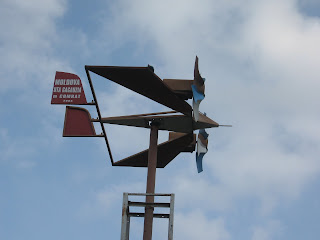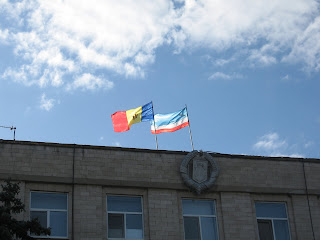
Recently, one of the Fulbrighters mentioned to us that an American she knows in Chisinau had told her that he got tired of the rudeness of people in the shops in Moldova.
This caused general consternation in our group, because we all think that Moldovans are by and large extremely nice.
Of course, people don’t exactly smile at you when you walk down the street. You can’t expect waitresses to beam at you when you order a soda. Nevertheless, you will often find authentically friendly people working in the shops. It is more pleasant because you know that they are being gracious because they want to be, and not because their boss will get mad at them if they don’t. People seem kind of cold when you first arrive, but now that I have started to get to know the cleaning ladies and the copy guy at the university, I will hear a chorus of “Hello!” at the beginning of the day and “Good bye!” at the end (in Russian, of course).

Moreover, when I have been traveling, like Blanche DuBois I have always depended on the kindness of strangers. People on the buses will gladly help me find my way when I’m not sure where to get off. Once people know you are a foreigner, they will even chat with you a bit. One time a woman gave me very detailed instructions and even tracked down a taxi for me when I was trying to hail a bus to get back home from the town of Hincesti. When I said thanks, she replied, “Мы же люди!” (We are people, after all!)
My colleagues have also been quite nice. Last Friday I attended the wedding of Tatiana, one of the German teachers. It was very touching to be invited because I know she didn’t have many spots available because she had to invite all of her distant cousins from all over Moldova. Three of us from the department went as representatives and had a very fun time. Her mom even came by and asked me if I was understanding everything, which I thought was cute. There were about 150 guests and they really put out quite the feast! I forgot my camera, but Tatiana said I could download a photo or two to show my friends, so expect a picture update soon!
Probably the coolest thing has been the enthusiasm of Moldovans who live in America to introduce us to their families. Not one but two Moldovans that I knew through friends in the States have gone out of their way to give me the phone numbers of their families to visit here. Keep in mind, these were people that I knew through the most tenuous of connections! One Moldovan happened to go to school with my cousin in Georgia, and another was friends with the foreign exchange student who lived with my parents’ friends. What is surprising is that people are actually sincere! They will actually get offended if you DON’T contact their relatives.
I think this is one of the benefits of being in a small country. People are pretty tickled that you actually care enough to come here, so they are happy to help confused foreigners like myself.








